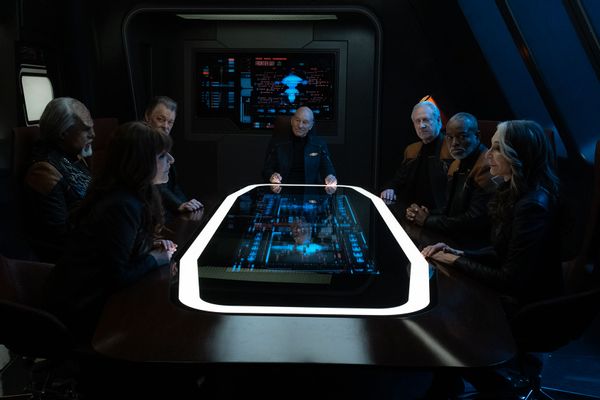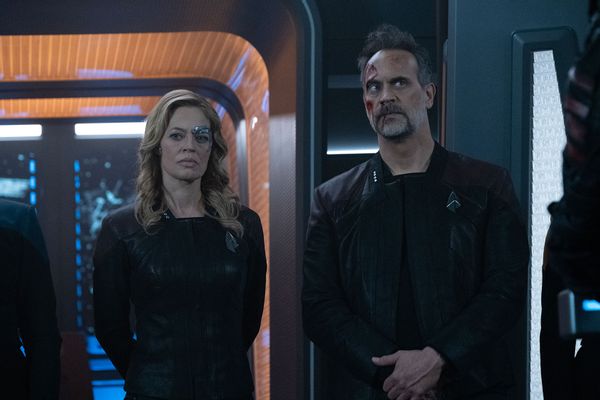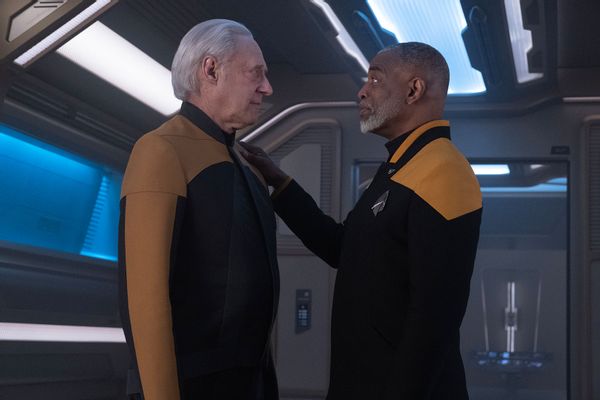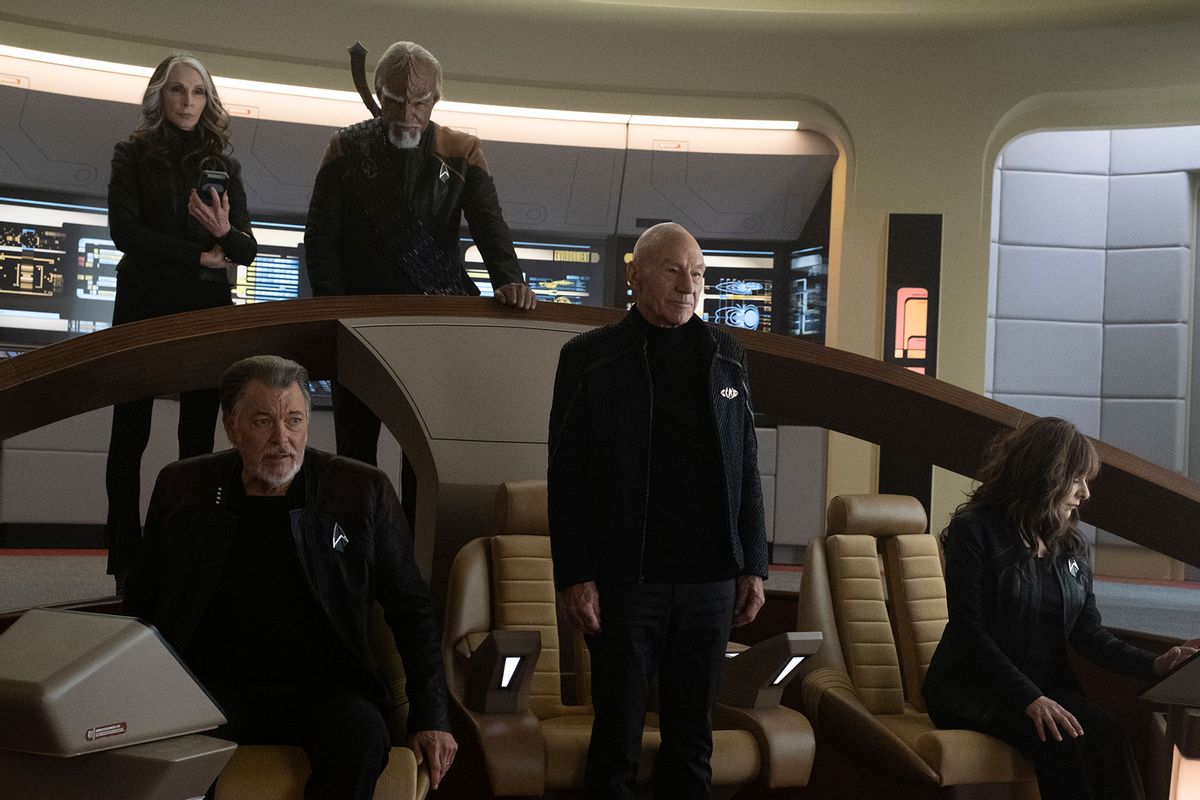It took eight episodes for the sendoff season of "Star Trek: Picard" for me to stop fighting the welling and let a tear or two flow. A scene where the full "Next Generation" crew sits around a table for the first time in decades is what did it.
The circumstances necessitating this reunion are grave. Even so, in those frames, everyone looks happy to see each other. In taking a beat to appreciate that fellowship the writers achieve something few series pull off well: It takes devoted viewers out of the scene without dropping our connection to the action.
We understand that this moment, along with the rest of the season, is as much about celebrating the cast as it revels in the long-delayed coming together of Starfleet Admirals Jean-Luc Picard (Patrick Stewart) and Will Riker (Jonathan Frakes), the resurrection of Data (Brent Spiner) and with him, the resumption of his friendship with Geordi La Forge (LeVar Burton), the reinventions of Dr. Beverly Crusher (Gates McFadden) and Worf (Michael Dorn) and pressing Deanna Troi (Marina Sirtis) back into the service of the saving the star system.
Showrunner Terry Matalas knew exactly what he was doing by giving this scene the pause and weight it merits before plunging the old guard into a battle for Earth, the Federation itself and the known galaxy.
 Jonathan Frakes as Will Riker, Brent Spiner as Data, Patrick Stewart as Picard, Michael Dorn as Worf, Marina Sirtis as Deanna Troi, LeVar Burton as Geordi La Forge and Gates McFadden as Dr. Beverly Crusher in "Star Trek: Picard" (Trae Patton/Paramount+)
Jonathan Frakes as Will Riker, Brent Spiner as Data, Patrick Stewart as Picard, Michael Dorn as Worf, Marina Sirtis as Deanna Troi, LeVar Burton as Geordi La Forge and Gates McFadden as Dr. Beverly Crusher in "Star Trek: Picard" (Trae Patton/Paramount+)
That arrives an episode later when the mysterious plan related to Frontier Day reveals another entity's revival, Picard's greatest foe. All season long Jean-Luc and Beverly have been battling and fleeing a Changeling incursion that has compromised Starfleet and has designs on their son Jack Crusher (Ed Speleers). Only in the final moments is the full extent of their plan revealed – they've joined forces with the Borg and, using Jack as the key, intend to assimilate all of Starfleet in a single swoop.
In another twist that invites multiple interpretations, the fleet-wide infection of Borg-altered DNA into the physiologies of Starfleet personnel only affects younger beings – in human terms, those 25 and under. It's up to the olds to save the day, along with solidly built but obsolete technology and weaponry.
And that turn of events coaxed forth a fresh batch of nostalgic tears, as Geordi reveals the surprise he'd been holding back for the right moment: the sight of a fully restored and spaceworthy Enterprise-D – the beloved, reliable O.G. from "TNG."
"The Next Generation" ended in 1994 with "All Good Things . . ." an excellent closer by any standard. A season ago if one were to ask whether "Picard" could pull off a conclusion of similar quality they'd be laughed out of the room. Season 2 was a mess – not unwatchable but certainly unworthy. I'm in the small group that enjoyed the first season of "Picard" for the way it endeavored to expand upon the title character's profile while digging into his flaws.
Season 3 of "Picard" discovered a way to look back with affection and reach toward the future with confidence.
That season was shepherded by Alex Kurtzman, who co-wrote 2009's "Star Trek" and fell back on that big-budget feature's emphasis on action. Kurtzman surrounded Picard with a pirate crew, including a disgraced Starfleet officer Raffi Musiker (Michelle Hurd), and reintroduced Seven of Nine (Jeri Ryan) as a vigilante. But as much as people loved seeing a "Voyager" favorite return as an ass-kicker, the whole idea that any ass-kicking was central to a Picard-related title was not universally well-received.
 Jeri Ryan as Seven of Nine, Todd Stashwick as Captain Liam Shaw in "Star Trek: Picard" (Trae Patton/Paramount+)
Jeri Ryan as Seven of Nine, Todd Stashwick as Captain Liam Shaw in "Star Trek: Picard" (Trae Patton/Paramount+)
Apart from that, although "The Next Generation" gave its crew a marvelous send-off, the abrupt discontinuation of their theatrical missions left the sense that there were more stories to tell.
The issue with the new Paramount+ rendering of Gene Roddenberry's universe has been how "Star Trek" is being realized – which is to say, as tales that diverged from the franchise creator's optimism and humanistic bent to play with grim darkness.
In the main, that's rubbed people the wrong way, especially those who view "Star Trek" as a set of ideas that can be tinkered with but are obligated to operate within a prescribed set of boundaries. "Star Trek: Strange New Worlds" hews closest to the original series and canon and the "TNG" framework.
If "Strange New Worlds" won over fans old and new by reprising the familiar episodic beats of "Star Trek" and "Star Trek: The Next Generation, Season 3 of "Picard" discovered a way to look back with affection and reach toward the future with confidence.
By incorporating the characters, plot developments, and sentiment of the old TV series – all of them, including "Deep Space Nine" and the aforementioned "Voyager," and a couple of Easter eggs acknowledging the '60s original – it appeases those fans who miss their old friends and thrill at the possibility of seeing them in new adventures.
It also gives viewers a gift in Todd Stashwick's Captain Liam Shaw and Amanda Plummer's Vadic, the relentless bounty hunter who giggles at every death she metes out in her quest to seize Jack. Plummer performance dances the line between maniacal and hysterical; she's the galactic version of the Joker with all of the chill and none of the punchlines.
Stashwick's Shaw, though, adds necessary sobriety to all the swashbuckling as the prickly captain of the U.S.S. Titan. He is compelled to help Picard, Riker and the Crushers and resents nearly every minute of it – but follows through because he's duty-bound, Starfleet to the core. Shaw isn't merely a sarcastic foil to the old guys, he's genuine and honest and has good reasons to despise his forebears. They're allowed to get away with far more than he could because they're considered heroes while officers like him will be lucky to get a few paragraphs in the organization's record books.
The only way this season fell short [is] that by the time the entire team finally assembles, "Picard" is nearly over.
Shaw reminds us of the ways "Picard" refuses to pander to the legacy of Picard, Riker, Worf, Crusher and the rest. But as it surfaces their mistakes and past transgressions, the worst being Picard's legendary murder streak when he was assimilated as Locutus of Borg, it also empowers them to face those shadows in ways they couldn't before.
"Picard" reintroduces Worf as a samurai; I have no notes! Crusher, formerly relegated to the ship, proves handy in a firefight, as we're reminded again in a comedic moment that cuts the finale's tension during a critical action sequence.
And Data, who died in "Star Trek: Nemesis" and died again in the first season of this show, is reborn in the best way, integrating the programming of his malevolent twin droid Lore's emotionality with the goodness he learned by living with the Enterprise crew.
Want a daily wrap-up of all the news and commentary Salon has to offer? Subscribe to our morning newsletter, Crash Course.
Describing all of this as fan service isn't entirely inaccurate, but it gives short shrift to the ways Matalas honors everything "The Next Generation" was. Seeing Spiner and Burton reconnect with such joy, along with watching Frakes' Riker spar with Dorn's Worf, provided the kind of delight we may not have realized how much we've missed until we took in these scenes.
 Brent Spiner as Data and LeVar Burton as Geordi La Forge in "Star Trek: Picard" (Trae Patton/Paramount+)
Brent Spiner as Data and LeVar Burton as Geordi La Forge in "Star Trek: Picard" (Trae Patton/Paramount+)
They also call out what may be the only way this season fell short, in that by the time the entire team finally assembles, "Picard" is nearly done. I can't say I disagree with the way Matalas and his writers spaced out each crew member's reappearance, but they wrote each with such depth as to leave us wanting more.
That needed to be done, since a key scene from the finale's ending, and an epilogue, hint that the adventures of Seven of Nine, Jack Crusher and Raffi – and the Starship Enterprise – are not finished. That gives us hope that we haven't seen the last of our old friends, either.
If some of this sentimentality softens our expectations for other "Star Trek" titles, including the upcoming movie "Section 31" starring Michelle Yeoh, so be it. As one character observes in this final season, evolution isn't an act of preservation, it's addition. "Picard" reminds us of this by sending off The Next Generation crew one last time honorably, and perhaps even hopeful for what may come next.
All episodes of "Picard" are streaming on Paramount Plus.
Read more
about "Star Trek"



Shares